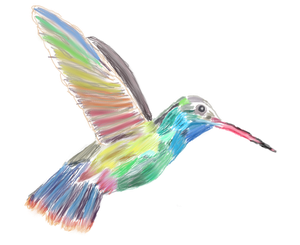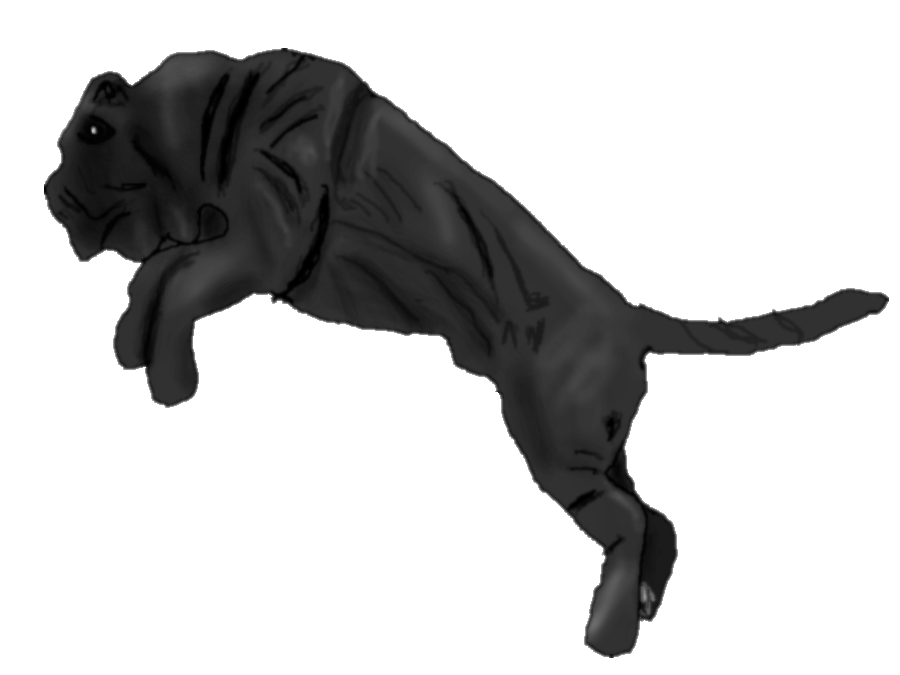Kolibri
Exhausted after a fight with the great anaconda, I’d stumbled around beneath the canopy, searching in vain for a way out of the valley. Eventually I collapsed in a heap next to a pool of brackish water. Ribs crushed, I lost track of time as I bobbed in and out of consciousness. I later determined it’d been at least 2 days when a rainbow mote appeared before my eyes, flitting and flickering around the small clearing. When I failed to move, it eventually landed but a hand’s breadth from my face: a small bird, not unlike a hummingbird, bursting with colors and warbling a low, dove-like coo. A strange low droning note accompanied this song, holding steady in the background as the song rose and fell. I roused myself, and the cheerful intruder flicked away to a nearby branch before stopping and looking back at me.
As I stumbled forward, it continued apace, pausing on branches to stare back at me and exhorting me with mellow tones. As evening approached, it led me over the rim of the valley to the side of a small, clear brook. As I bent to slake my thirst, the bird gave a final chirp and then buzzed off into the dusk air.
 The kolibri is a small jungle-dwelling songbird, ranging in size from smaller than a gold crown up to the handspan of a goliath. Rarely seen in populated areas, they thrive in the jungles to the south and west of Moru Kel, ranging past Tarima and toward the limits of Esmi. They seem to be somewhere between the swifts and the hummingbirds in disposition, with a diet consisting of both nectar and insects. Like the hummingbird, they have excellent vision spanning outside of the human limits — some sages believe that their sight surpasses even that of the deep elves, allowing the kolibri to see into the Border Haze.
The kolibri is a small jungle-dwelling songbird, ranging in size from smaller than a gold crown up to the handspan of a goliath. Rarely seen in populated areas, they thrive in the jungles to the south and west of Moru Kel, ranging past Tarima and toward the limits of Esmi. They seem to be somewhere between the swifts and the hummingbirds in disposition, with a diet consisting of both nectar and insects. Like the hummingbird, they have excellent vision spanning outside of the human limits — some sages believe that their sight surpasses even that of the deep elves, allowing the kolibri to see into the Border Haze.
Of special note is the kolibri’s range of “vocalizations”: that term is used loosely, for their songs are produced not only through traditional singing but also via the beating of their wings. Their rapid wing beats produce a droning, harmonic tone not unlike the drone of the kantor pipes used by various groups in the Burkhdyn Gazar. Their song intertwines with this note, producing an eerie harmony during times of true performance. This droning requires extra effort from the birds; during normal flight they are no louder than a Kilpo Bay needletail.
Kolibri are considered good luck, with numerous stories of how they’ve led lost travellers to safe locations, warned them of incoming predators, and even signalled forthcoming storms to the weary. On rare occasion they’ve been known to guide lost shipbirds as well. Harming the kolibri is known to bring bad luck to the malefactor.
Bad dog!

↞ Previous: Kernu Next: Lacewort ↠Daira knelt down to take a sip of water from the clear stream at the edge of the forest she’d been hunting in. She smiled at the imbabala across from her: skittish forest antelopes by nature, the fact that it hadn’t startled was a testament to her quiet elven feet. The cool water was a welcome reprieve from the languid rainforest humidity.
A soft flutter of wings caught her attention, ears perking up as she turned to see a small kolibri burst out of the forest in prismatic colors. “Good luck!” she thought to herself. Moments later, another emerged. Then a third, making haste in the same direction as the first pair. Daira frowned to herself and looked again at the imbabala sipping serenely from the stream.
“Something isn’t right,” she thought. She stood up and began to run after the birds, glancing back just in time to see an inky-black spectral mastiff leap from the forest, locking its jaws around the hapless imbabala.
If she were lucky, the meal might delay the fell beast long enough for Daira to get back to her village and sound the alarm . . . .